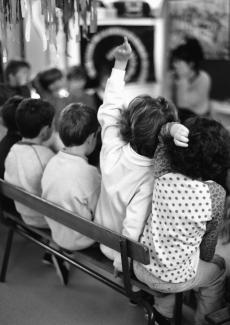
Collaboration and complexity
April 3, 2015
The first responses addressing concerns about CCSS in early childhood education are from Kathleen A. Paciga, Columbia College Chicago; Jessica L. Hoffman, Winton Woods City School District; and William H. Teale, University of Illinois at Chicago.
Concern: The standards are complex and extensive, and there is little guidance for teachers to implement them in Kindergarten classrooms.
On the one hand, yes, the standards are “complex” in the sense that they are communicated in a complicated document that represents high-level goals for student learning. Furthermore, they do not prescribe how a teacher should actually teach each standard, which speaks to the issue of little guidance. This lack of guidance has its downside: it can easily lead teachers to employ a didactic pedagogical approach to kindergarten literacy education, thinking that each standard is best “taught” directly, thus missing opportunities for authentic language and literacy practices, embedded in activities with larger conceptual goals.

On the other hand, we have been quite underwhelmed by the lack of complexity of the learning expectations in a number of standards at the kindergarten level. Take for instance, Reading Standards for Literature Standard 6, “Assess how point of view or purpose shapes the content and style of a text.” At the kindergarten level, the standard reads, “With prompting and support, name the author and illustrator of a story and define the role of each in telling the story,” which contributes almost nothing to the development of the anchor standard. We would support a higher standard to be achieved with support, such as, “With guidance and support, describe differences among characters’ points of view and how those differences affect character feelings and actions.”
The problem with a number of the kindergarten ELA standards is that they represent goals for independent mastery to be demonstrated by the end of the school year. Over-emphasis on what kindergartners are expected to do independently (or with minimal support) can easily translate into classroom practice narrowly focused on very basic skills (often unrelated to the anchor standards), with few of the higher-level foci of the anchor standards being modeled and supported in early education. There are many other places in the more complex strands of the standards where standards at the K level either: (1) do not include a grade level standard, or (2) “dumb down” what children are expected to do in K, even with adult support (see extended discussion and detailed examples in Hoffman, Paciga, & Teale, 2014).
To be clear, we are not arguing to up the ante for kindergarteners’ independent reading performance. However, we do argue strongly for upping their daily participation in collaborative experiences with teachers and peers around complex literacy tasks that are better aligned to later grade level and anchor standards, e.g., modeling and discussion through think alouds and guiding questions in interactive read alouds of complex texts and shared writing activities. It is important to remember that students require much collaborative practice with complex literacies in early childhood before they will be able to demonstrate proficiency independently in later grades.
About NIEER
The National Institute for Early Education Research (NIEER) at the Graduate School of Education, Rutgers University, New Brunswick, NJ, conducts and disseminates independent research and analysis to inform early childhood education policy.
